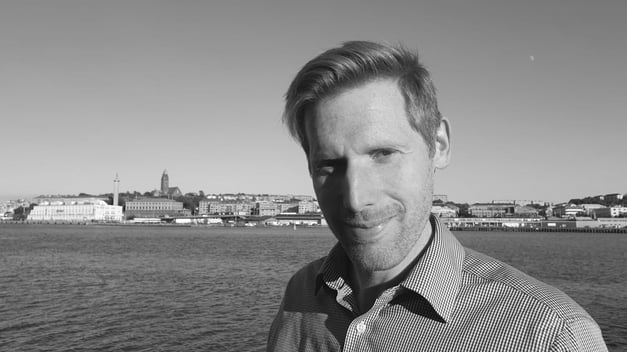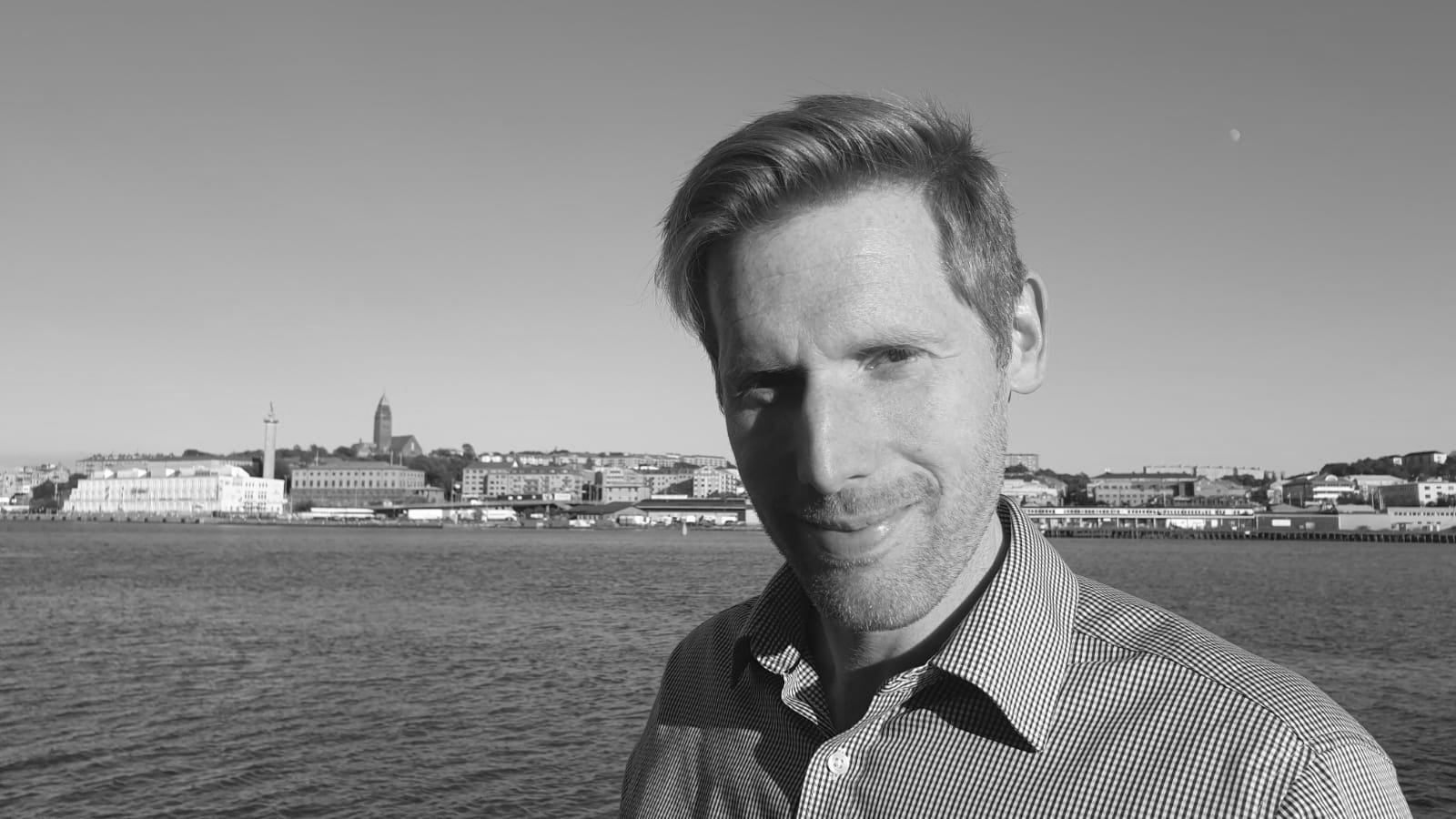In May Mark Hooley joined Zooma as a Content Creator. So, I decided to interview him about how he became a Zoomer.
Mark moved from the UK to Sweden to live and work in the beautiful city of Gothenburg. Mark brings vast experience and knowledge in working with Digital Marketing and Communications within both B2B and B2C.

Mark, tell us a little bit more about your background. What have you studied?
I've always been interested in why people buy things and what makes people decide on what to buy. At college, I studied Business Studies, Communications Studies and Psychology. After that, I decided to do a degree in Advertising & Marketing Communications. Since then, I have acquired broad experience in Marketing and Communications with a passion and specialism for digital marketing and branding.
What has happened after you have graduated?
I have gained lots of experience over the past 15 years. In my last role, I project managed the building of a new website and rebranded the organisation. Building the new site was all about creating relevant content, increasing traffic and conversions.
Digital has always been a focus of mine. Twelve years ago, I used to manage the UK's biggest Blood Pressure testing event and awareness week and turned it into an award-winning event. I digitalised the whole event, from building a microsite, through to the registration process, search facility, recording of data and then how people become members of the organisation.
A lot of my experience in the UK is from the charity sector. There are 185,000 charities in the UK – it is a large and competitive sector. But within that, I also worked and have got quite a lot of experience with B2B, where I have worked with some of the biggest pharmacy chains in the UK.
I saw on your LinkedIn profile that you are a "Charter Marketer". Tell us a little more what exactly that is.
Yes, in 2011, I was awarded the status of Charter Marketer by the Chartered Institute of Marketing. It is awarded to the highest-level marketing professionals in the UK. I wanted to keep my skills and knowledge relevant and up to date. Part of being a Chartered Marketer is committing to doing continual professional development each year.
So, how you end up in Sweden?
My partner is Swedish, and I met her when I was cycling in different parts of the world. We had a long distance relationship for a while and decided we wanted to make Gothenburg our home, having visited here a few times. Gothenburg is a beautiful city, fantastic people and a lot of nature. I worked remotely for six months, traveling back to the UK every few weeks. But decided I needed to establish a life in Gothenburg!
Why have you decided to work at Zooma?
I have always been on the client side, working very closely with agencies. In my last role, I managed the relationships with agencies, who were an essential part of my expanded team. So, it is exciting and enjoyable to work from the other perspective. I have always wanted to work on the agency side because agencies are highly specialised, creative and deliver key outcomes.
Zooma seems a fantastic place to work. It is full of passionate, highly skilled and intelligent people that want to make a big difference. Another key thing for me is that ultimately, our ethos is to give the skills and knowledge to our clients, so they know how to do the work and can do it. To me, helping make that difference organizationally, rather to just deliver a fantastic piece of work is what Zooma is all about. My philosophy has always been to leave organisations in a better position than when I joined, and I think that ties in nicely with Zooma's philosophy of ultimately wanting to put ourselves out of work.
What do you like best about your role as a Content Creator?
I like to get involved and make content that gets results. I really like to think about a problem and how you can influence someone. What are the key aspects that make someone buy something or to take a decision? Then what is the best content we can make to influence this? I find this very interesting and the different approaches it's possible to take. It can give you a lot of creative possibilities as well.
What does your typical workday look like at Zooma?
The variety is really good: I could go and interview someone; I could be writing an article or a content offer; I could be thinking about the best way to make the most persuasive piece of communication for a persona or target audience. I like working with different clients; you can learn different things, and there are synergies.
I enjoy working with the inbound philosophy. Back at University, I was taught:
"If you can't measure something you shouldn't do it."
And I have always taken that approach. This fits in nicely with the inbound philosophy.
What are your first reflections of three months working at Zooma?
It has been very good to get very involved straightaway in several projects. I like to do that. I believe it's very good that Zooma likes to challenge. I have always tried to do that, everywhere I have worked. I think by challenging the norm, you can get the best results and better results than people expected. So, I believe when Zooma challenges, it is an integral part of taking things to a higher level.
Everyone works closely together here, is very knowledgeable and wants to deliver the very best. And everyone has been very warm and friendly in welcoming me.
Since you moved to Sweden, what are the main differences compared to England you have noticed?
In Sweden, there is a lot more discussion. Organisations tend to be flatter, and people collectively come to a decision, it is a good way for everyone to be involved and to get different viewpoints as well. In the UK, there can sometimes be a less collaborative and more top-down approach. It is more collaborative here. And I think that is a good thing. Organisations are far flatter here, which is good because I think it means people are more empowered.
Because of the population of Sweden, Sweden has to be open-minded. Especially from a business perspective, most businesses have got to think, how can we make something that we can scale off in Europe or over the world because the Swedish market is small. I think this gives a positive and different mindset. In the UK, because of the size of the population, it's often possible to focus on the UK first and think about European/ global expansion later. Here, because the population is so much smaller, people must think about things differently.
The work-life balance is better in Sweden. People tend to leave on time from work. It is important to have other things to do outside of work. And I think out of work activities are crucial in Sweden.
Swedes are healthier, and it's important to have a healthy mind and body here, and I think that ultimately benefits how people work. I think this is the first place I have worked where you can sit down and have lunch together in a communal area. In all the places I have worked in the UK, people eat at their desks.
Having said that, Swedes place importance on dressing well, being active and healthy, and people are very trend sensitive in Sweden. Suddenly electric scooters are everywhere being driven by people of all ages and Poke bowls are in every restaurant.
What do you enjoy doing when you are not working?
I am always training for an event. I recently did my 2nd half Ironman, which was in Vansbro. Ultimately, I would like to try to do a full Ironman. I am usually training for a half marathon or something; it's the only way of ensuring I get out and do the exercise!
I love spending time outdoors: I do a lot of running, cycling and hiking. I think cycling and hiking long distances is the best way to see and experience a country. You get to see how a land changes and it is a great way to see beautiful surroundings, because of the slow speed you are traveling at. You can actually take the whole scenery in, whereas in a car or bus you often just bypass it.
Ten years ago, I cycled from the very bottom of England to the top of Scotland: It was great to see how the landscape changed. We went along coastlines, past rolling green fields, through national parks and then in Scotland, lovely mountains and lochs in amazing scenery. Cycling across a country leaves an imprint on you of how a country looks and feels. I have also cycled from the top of Morocco to London in 2,5 weeks around New Zealand and in parts of South East Asia and Europe.
You can be tired at the end of the day, but you are also energised thanks to all the fresh air. A fully loaded bike is always a great way to meet local people. As people always come to talk to you and ask where you are going, what you are doing etc.
Thank you, Mark! We are happy to welcome you as a Zoomer.







